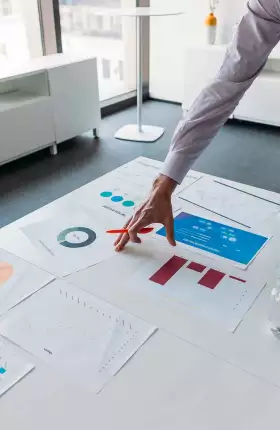Setting the right price is one of the most critical—yet least understood—elements of sustaining or improving the profitability of a business. Boston Consulting Group pricing expert Amadeus Petzke sat down with BCG colleague Felix Schuler to discuss an initiative he leads that uses “war games” to help clients hone their pricing strategies. The games use an innovative cloud-based approach that aims to help companies gain insights into market mechanisms.
What is a pricing war game, and how does it help you price better?
A pricing war game is a simulation exercise in which company participants play the roles of key stakeholders in a market, such as competitors, large customers, regulators, and representatives of their own company. Players make decisions amid uncertainty. They are guided by predefined game objectives for the entity they play, and by other players’ actions and quantitative information that models the market. The game combines human decision making, which is not always rational, with advanced data analytics to simulate potential market landscapes and thereby help improve strategic price management within a company.
The value of a war game comes more from the experience of playing the game than from the actual game outcome—who wins or loses. Players learn how the pricing moves they make to meet their objectives depend on what other players do. They observe how their actions and reactions to each other can impact the overall game-market outcome. This allows them to quickly simulate an experience that would take years to develop in real life. Ultimately, a war game enables a company to gain insights into how interdependencies develop in an industry, how pricing moves can be perceived by others, and how customers may react. In the process, it helps participants learn about themselves and the overall market. For example, one senior executive playing the role of a competitor declared after the game was finished, “I thought it was our competitors who were making erratic price moves, but it has been us as well!”
What differentiates BCG’s approach to pricing war games?
BCG has developed a platform that allows us to create customized war games for our clients, modeling the important industry-specific factors that impact their pricing strategies, such as discounts and trade spend for retailers, networks and fare structure for travel companies, price indices for raw-material producers, or the preferences of different customer segments. Participating in war gaming helps companies move beyond technical pricing capabilities and become comfortable developing winning pricing strategies through a deep understanding of the game.
Our proprietary cloud-based software platform allows us to conduct highly advanced pricing war games with hundreds of simultaneous players, large amounts of data, and complex, real-time modeling. Since the platform is online, the entire war game can be conducted virtually: participants do not need to be in the same physical location.
To which industries can a war game apply?
Pricing war games are most helpful for highly concentrated industries in which two to three competitors together control 50 percent or more of a market. This can be the case in almost all industries, from business-to-consumer sectors, such as retail, travel, consumer products, and health care, to business-to-business industries such as energy, mining, machinery, and chemicals. We have recently facilitated war games with clients in the airline and grocery retail sectors and continue to develop new concepts for other sectors.
Can a war game predict what competitors will do?
A pricing war game is not a forecasting tool. That is not its purpose. Its objective is to put players from a company in the shoes of different stakeholders within their industry and help them assess the likelihood of the actions and reactions of each. A war game helps identify the potential competitive risks of a pricing strategy and thus the development of mitigation plans.
How do you apply what you learn from a pricing war game to your daily business?
First of all, it is essential who plays the pricing war game. A war game triggers the intellectual and emotional engagement of its participants and can therefore help prepare and drive change. But that is only possible if actual decision makers and executors of pricing decisions within a company participate in the game. Otherwise, the likelihood of getting actionable outcomes from the war game is low. To get traction, it is essential to incorporate pricing war games and their outcomes into the definition of the company’s overall pricing strategy and risk-assessment process.
To make the game as instructive as possible, we also simulate the communication of new prices, consumer reactions, and factors like investments or mergers and acquisitions. Players communicate online in real time during the war game, for instance, to simulate contract negotiations and press releases. Very often, the key to price management is to not only find an approach that can be applied consistently but also to define the right execution and communication strategy with customers.
What does it take to get started? Is it very complex?
We follow a standardized approach to set up new pricing war games. A preparation phase defines the war game parameters, such as the game’s objectives, market specifics, data and modeling requirements, and layout of the Web portal. The game is created according those parameters. Once this is done and aligned with key stakeholders, the war game can take place. With our approach, a pricing war game can be conducted in six weeks—including postgame analysis—with very limited resource requirements on the client’s side. The tool can be used over and over, helping to bolster capabilities and pricing sophistication. And it’s fun!






